In Vocation
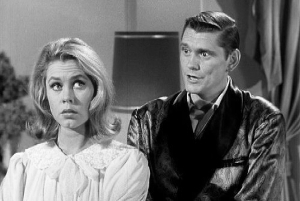 What does everyone know about Bewitched? It's about a free-spirited young witch whose uptight husband does everything he can to suppress her natural inclinations to magic.
What does everyone know about Bewitched? It's about a free-spirited young witch whose uptight husband does everything he can to suppress her natural inclinations to magic.
No. It's not.
Go back to the first season, before the show became focused on the farce, and you'll clearly see its theme. Abandon the feminist distortions and you'll see that Bewitched is about two newlyweds, thoroughly in love, who are trying to establish a normal, suburban life.
Both Samantha and Darrin have given up their prior lives; both have freely chosen their marriage; and both want it to be as it should be. What did Darrin give up? He's an executive at an ad agency, what the early 1960s considered to be the exemplar of white-collar hustle. To be sure, when he marries Samantha he keeps his job; but he does not keep the life of a Mad Man.
Sheila, an old flame, recently back from Nassau, having heard that Darrin is now married, invites him to a party. Come, she insists to a hesitant Darrin; everyone will be there. "We're your friends," she reminds him. So Darrin and Samantha go, thinking it's just a pot-luck; but of course Sheila has thrown a formal soiree. "Is this your little bride?" Sheila asks, superciliously, when the modestly dressed Samantha is presented to her. And during dinner Sheila goes on about Newport, Paris, Maxim's, the Riviera, Countessas and scandals… Darrin, though modestly from Missouri and not so wealthy himself, had been jetting with the jet-setters.
When, another time, Samantha is seeking a boyfriend for a friend of hers, she settles on a bachelor at McMann & Tate, an art director named Kermit. Darrin is doubtful. "Kermit's having a ball being single," Darrin says. "Women throw themselves at his feet. What a life that Kermit lives!" Samantha replies: "You were leading the same kind of life when you met me — and you were glad to give it up." Darrin, in other words, has chosen a new, more earthbound path — even though it takes him from his Nassau-hopping friends and his tomcatting ways, and is even apparently something of a financial burden, since, right away, quite naturally, as he seeks a home for himself and his wife, he must admit they will have to tighten their belts to buy a house.
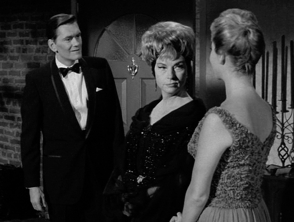 Indeed, it is class that truly animates the objections of Samantha's parents. Referring to mortals such as Darrin, Endora sneers: "They all look alike to me. Noses to the grindstone; shoulders to the wheel; feet firmly planted on the ground… No wonder they can't fly." Endora is as jet-setting as Sheila. Once, she drops in on Samantha, who is quietly playing solitaire at home, and invites her to lunch. Samantha agrees and suggests a little place around the corner. Endora counters by suggesting a bistro in Paris. Though Samantha hesitates, she agrees to go, and does enjoy herself. And Endora asks: "Don't you sometimes miss all this?" Samantha answers: "Not really. I have other things that make up for it." Endora is dismissive: "Like a snappy game of solitaire? Topped off by a gourmet lunch at the cozy Have-a-Snack?"
Indeed, it is class that truly animates the objections of Samantha's parents. Referring to mortals such as Darrin, Endora sneers: "They all look alike to me. Noses to the grindstone; shoulders to the wheel; feet firmly planted on the ground… No wonder they can't fly." Endora is as jet-setting as Sheila. Once, she drops in on Samantha, who is quietly playing solitaire at home, and invites her to lunch. Samantha agrees and suggests a little place around the corner. Endora counters by suggesting a bistro in Paris. Though Samantha hesitates, she agrees to go, and does enjoy herself. And Endora asks: "Don't you sometimes miss all this?" Samantha answers: "Not really. I have other things that make up for it." Endora is dismissive: "Like a snappy game of solitaire? Topped off by a gourmet lunch at the cozy Have-a-Snack?"
Another moment of snobbery comes when Maurice has been shown a picture of Darrin in an Army uniform. Maurice doesn't yet know Darrin is not a warlock, and so he is surprised that Darrin would have been in the Army. Samantha, unready to admit that Darrin is mortal, says: "Everybody goes into the service." Doubtful, Maurice replies: "Everybody, perhaps, but not us." While by "us" Maurice may only mean "we witches and warlocks," notice the flavor of it all: Maurice, haughty Maurice, a well-dressed, urbane man who has arrived in a limo, scorns a man who would join the Army. When Maurice learns what Darrin really is, he exclaims that his daughter has married a "common, ordinary mortal!" Endora, trying to placate him, says: "Times have changed. This happens in the best of families." Maurice is unpersuaded. "I can't understand it," he cries to Samantha. "A girl of your background, of your breeding!"
Now, of course Samantha did not merely descend from the upper classes. She descended from a higher plane. Her primary motivation is her love for Darrin, but she wholly enters into the role of wife. She wants to be a homemaker. She wants to make a home. In contrast, perhaps, to her maiden life; for her parents are clearly separated. When Maurice arrives, Endora says: "Nice to see you." When Maurice beholds Samantha, he remarks: "You must be my daughter;" and to Endora: "She turned into quite a girl." Endora, at one point, threatens to move in with Maurice.
Samantha does not come from a grounded, unbroken family.
When defending Darrin's plans to find them a house, Samantha says to Endora: "All young married people dream of owning their own home." And Endora declaims: "That's fine for them, Samantha, but not for us. We're quicksilver, a fleeting shadow, a distant sound. Our home has no boundaries beyond which we cannot pass. We live in music; in a flash of color. We live on the wind; in the sparkle of a star… And you want to trade it all for a quarter of an acre of crabgrass."
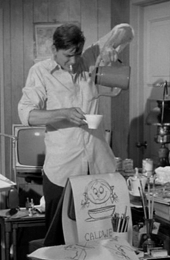
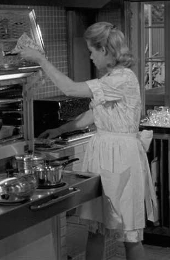 Yes, Samantha does want to trade it all: not for the crabgrass as such but for the house it surrounds: for the home inside the house. And Samantha knows that the proper way to make a home is to make it. A home is a thing of work. Shoulders to the wheel. Why, Endora wonders, doesn't Samantha just create that cup of coffee she wants, ex nihilo, with a twitch of her nose? Says Samantha: "This is a normal household and I'm trying to avoid witchcraft." Why be down on your knees, planting flowers, when you can just wish them into existence? "We're going to do it the right way — from seeds." Why not just wave your hands and clear this clutter so that we can leave already? "I'm going to stay here," Samantha says, "and clean this house with my own two hands." And now you're baking a cake? "I want to do something for my husband."
Yes, Samantha does want to trade it all: not for the crabgrass as such but for the house it surrounds: for the home inside the house. And Samantha knows that the proper way to make a home is to make it. A home is a thing of work. Shoulders to the wheel. Why, Endora wonders, doesn't Samantha just create that cup of coffee she wants, ex nihilo, with a twitch of her nose? Says Samantha: "This is a normal household and I'm trying to avoid witchcraft." Why be down on your knees, planting flowers, when you can just wish them into existence? "We're going to do it the right way — from seeds." Why not just wave your hands and clear this clutter so that we can leave already? "I'm going to stay here," Samantha says, "and clean this house with my own two hands." And now you're baking a cake? "I want to do something for my husband."
Do something. That is the nature of marriage: doing. This is precisely the sort of mundane work that Endora, because of her powers, because of her class, disdains. When Darrin wonders if, perhaps, he should relent, and let Samantha use her magic to help his career, he realizes: "If I do it once I'll do it again, and before you know, I won't be able to do anything for myself." Samantha has willingly joined Darrin in a life of doing for oneself — and hence for each other.
All motivated, as said, by love.
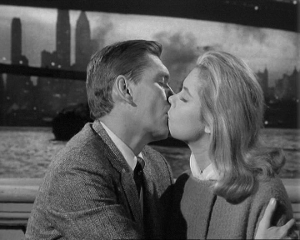 They've fallen hard for each other. They married before either had met the other's family; before, of course, Darrin even knew what Samantha is. They continually affirm their love to each other. There are many, slyly sweet scenes about their newlywed randiness. Considering that she is a witch and he a mortal, "I suppose I shouldn't have married you," Samantha says to Darrin, "but I love you so much." "I love you," says Darrin, "and I can't give you up."
They've fallen hard for each other. They married before either had met the other's family; before, of course, Darrin even knew what Samantha is. They continually affirm their love to each other. There are many, slyly sweet scenes about their newlywed randiness. Considering that she is a witch and he a mortal, "I suppose I shouldn't have married you," Samantha says to Darrin, "but I love you so much." "I love you," says Darrin, "and I can't give you up."
Impassioned though they are, they do not neglect that they are in a new state, a state of marriage. Sacrifices come for the sake of their normal household. Oh, Endora declares that Samantha can't change what she is. "I'm not trying to change," Samantha replies, "I'm trying to adjust." "He's trying to make you over," declares Endora; and Samantha counters: "He's doing no such thing." Samantha, for Darrin's sake, chose to abandon witchcraft.
In one episode, Darrin himself voices the feminist argument against Samantha's choice.
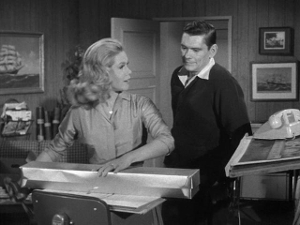 Then a gift comes to the house. Darrin had ordered this for their six-month anniversary — ordered it before his "liberation" of Samantha. The gift delights Samantha to the point of tears, for it is a gift he acquired for her not as a demigod but as her normal, loving husband. Then Darrin admits that he regrets the past couple of weeks. "Now I don't know," he says, "if I'm too crazy about the idea of never having to worry about anything anymore. Might be a good idea to worry about where your next meal is coming from. Gives you a chance to work up an appetite." Still tearful and happy, Samantha says: "Oh — You do understand!"
Then a gift comes to the house. Darrin had ordered this for their six-month anniversary — ordered it before his "liberation" of Samantha. The gift delights Samantha to the point of tears, for it is a gift he acquired for her not as a demigod but as her normal, loving husband. Then Darrin admits that he regrets the past couple of weeks. "Now I don't know," he says, "if I'm too crazy about the idea of never having to worry about anything anymore. Might be a good idea to worry about where your next meal is coming from. Gives you a chance to work up an appetite." Still tearful and happy, Samantha says: "Oh — You do understand!"
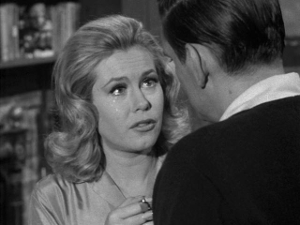 Samantha is not suppressed, repressed, or oppressed. "I'll be the best wife a man ever had." Samantha has chosen a certain way of being and, most importantly, a vocation for herself. The comedy of intermittent witchery comes, of course, in that vocations are often hard, especially since they usually involve some sort of self-control and a dedication to more than one's natural inclinations.
Samantha is not suppressed, repressed, or oppressed. "I'll be the best wife a man ever had." Samantha has chosen a certain way of being and, most importantly, a vocation for herself. The comedy of intermittent witchery comes, of course, in that vocations are often hard, especially since they usually involve some sort of self-control and a dedication to more than one's natural inclinations.
Witch and Wife
Monday, March 30, 2009 10:56 pm

No. It's not.
Go back to the first season, before the show became focused on the farce, and you'll clearly see its theme. Abandon the feminist distortions and you'll see that Bewitched is about two newlyweds, thoroughly in love, who are trying to establish a normal, suburban life.
Both Samantha and Darrin have given up their prior lives; both have freely chosen their marriage; and both want it to be as it should be. What did Darrin give up? He's an executive at an ad agency, what the early 1960s considered to be the exemplar of white-collar hustle. To be sure, when he marries Samantha he keeps his job; but he does not keep the life of a Mad Man.
Sheila, an old flame, recently back from Nassau, having heard that Darrin is now married, invites him to a party. Come, she insists to a hesitant Darrin; everyone will be there. "We're your friends," she reminds him. So Darrin and Samantha go, thinking it's just a pot-luck; but of course Sheila has thrown a formal soiree. "Is this your little bride?" Sheila asks, superciliously, when the modestly dressed Samantha is presented to her. And during dinner Sheila goes on about Newport, Paris, Maxim's, the Riviera, Countessas and scandals… Darrin, though modestly from Missouri and not so wealthy himself, had been jetting with the jet-setters.
When, another time, Samantha is seeking a boyfriend for a friend of hers, she settles on a bachelor at McMann & Tate, an art director named Kermit. Darrin is doubtful. "Kermit's having a ball being single," Darrin says. "Women throw themselves at his feet. What a life that Kermit lives!" Samantha replies: "You were leading the same kind of life when you met me — and you were glad to give it up." Darrin, in other words, has chosen a new, more earthbound path — even though it takes him from his Nassau-hopping friends and his tomcatting ways, and is even apparently something of a financial burden, since, right away, quite naturally, as he seeks a home for himself and his wife, he must admit they will have to tighten their belts to buy a house.

Another moment of snobbery comes when Maurice has been shown a picture of Darrin in an Army uniform. Maurice doesn't yet know Darrin is not a warlock, and so he is surprised that Darrin would have been in the Army. Samantha, unready to admit that Darrin is mortal, says: "Everybody goes into the service." Doubtful, Maurice replies: "Everybody, perhaps, but not us." While by "us" Maurice may only mean "we witches and warlocks," notice the flavor of it all: Maurice, haughty Maurice, a well-dressed, urbane man who has arrived in a limo, scorns a man who would join the Army. When Maurice learns what Darrin really is, he exclaims that his daughter has married a "common, ordinary mortal!" Endora, trying to placate him, says: "Times have changed. This happens in the best of families." Maurice is unpersuaded. "I can't understand it," he cries to Samantha. "A girl of your background, of your breeding!"
Now, of course Samantha did not merely descend from the upper classes. She descended from a higher plane. Her primary motivation is her love for Darrin, but she wholly enters into the role of wife. She wants to be a homemaker. She wants to make a home. In contrast, perhaps, to her maiden life; for her parents are clearly separated. When Maurice arrives, Endora says: "Nice to see you." When Maurice beholds Samantha, he remarks: "You must be my daughter;" and to Endora: "She turned into quite a girl." Endora, at one point, threatens to move in with Maurice.
Samantha does not come from a grounded, unbroken family.
When defending Darrin's plans to find them a house, Samantha says to Endora: "All young married people dream of owning their own home." And Endora declaims: "That's fine for them, Samantha, but not for us. We're quicksilver, a fleeting shadow, a distant sound. Our home has no boundaries beyond which we cannot pass. We live in music; in a flash of color. We live on the wind; in the sparkle of a star… And you want to trade it all for a quarter of an acre of crabgrass."


Do something. That is the nature of marriage: doing. This is precisely the sort of mundane work that Endora, because of her powers, because of her class, disdains. When Darrin wonders if, perhaps, he should relent, and let Samantha use her magic to help his career, he realizes: "If I do it once I'll do it again, and before you know, I won't be able to do anything for myself." Samantha has willingly joined Darrin in a life of doing for oneself — and hence for each other.
All motivated, as said, by love.

Impassioned though they are, they do not neglect that they are in a new state, a state of marriage. Sacrifices come for the sake of their normal household. Oh, Endora declares that Samantha can't change what she is. "I'm not trying to change," Samantha replies, "I'm trying to adjust." "He's trying to make you over," declares Endora; and Samantha counters: "He's doing no such thing." Samantha, for Darrin's sake, chose to abandon witchcraft.
In one episode, Darrin himself voices the feminist argument against Samantha's choice.
Darrin: I've been selfish, stupid, and unreasonable, and I want to ask for your forgiveness.You can lament Samantha's lack of consciousness; you can decry her supposed submission to patriarchy; but she knows what she wants a marriage to be. During that episode Darrin gets a taste of being a warlock, of having one's life enriched effortlessly. Samantha is not happy with his turn.
Samantha: I don't know what you're talking about.
Well, when we were married, you tried to fit yourself into my scheme of life.
I love you. I want you to be happy.
But what did I want? I wanted you to give up everything that was natural to you. I said, "No more witchcraft. Give it up." That's what I said. Isn't that what I said?
Yes, but I understand.
That's because you kept an open mind. But not me, no. My mind was closed, just like a clamshell. But that's all over.
Over?
Yes. From now on I want you to use that power whenever and wherever you want to.
Darrin — You don't really mean that?
I most certainly do. Why have I said to you, "No witchcraft. Don't help me, don't help yourself." Why? I ask you, Why? Well, I'll tell you why: It was ego. If I couldn't do it I didn't want you to do it. If I couldn't give something to you I didn't want you to have it. Ego! Pure ego. Simple as that.
Darling, that's not ego — that's the way it should be.


© 2004-26 David Skinner · All rights reserved